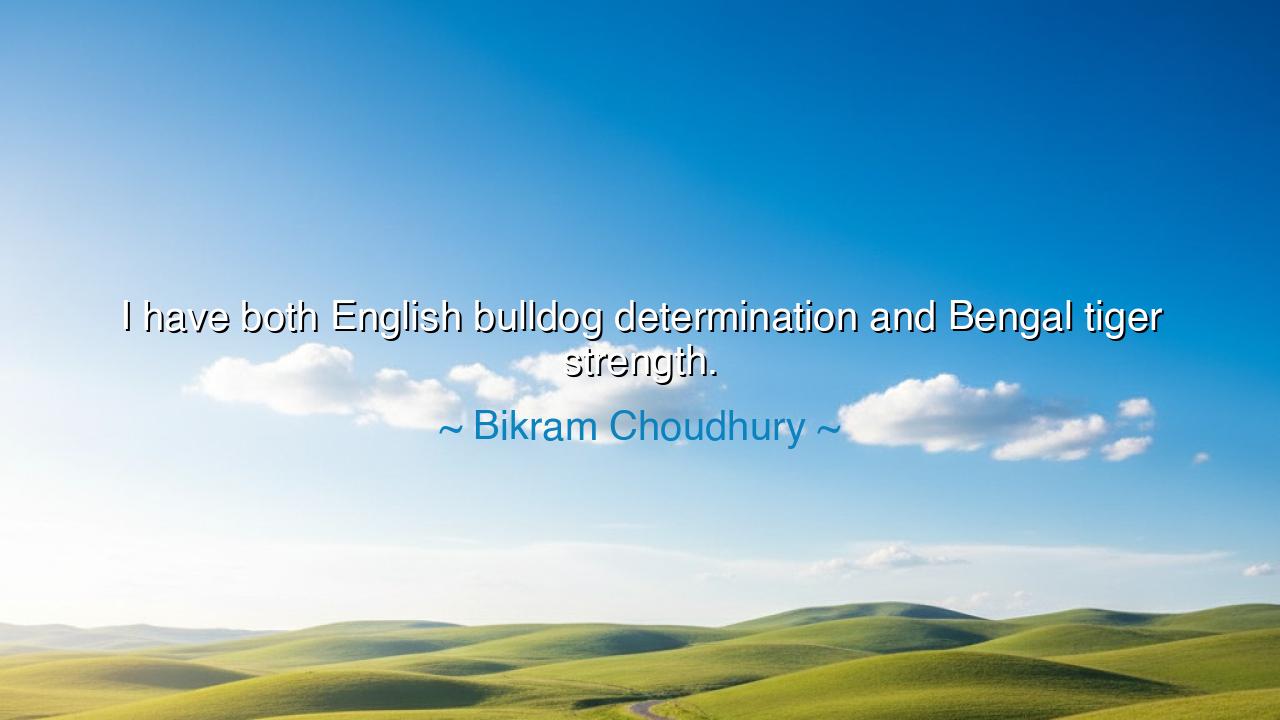
I have both English bulldog determination and Bengal tiger






Hear the words of Bikram Choudhury, a man who sought to define his essence with the spirit of beasts both steadfast and fierce: “I have both English bulldog determination and Bengal tiger strength.” In these words lies a vision of the human will when tempered by endurance and ferocity. For he joins together two powers: the unyielding perseverance of the bulldog, and the untamed majesty of the tiger. It is not enough to have strength without determination, nor determination without strength—the true warrior of life must possess both.
When he speaks of English bulldog determination, he calls to mind the small yet fearless creature that clings with unbreakable tenacity. Once it sets its jaws, it will not release, no matter the cost. So too must the human heart hold fast to its goals, refusing to surrender even when pressed by hardship or mocked by doubt. Determination is not glamour, but grit. It is the steady fire that burns through fatigue, the voice within that whispers, “Do not let go.” Without it, strength is scattered; with it, even weakness becomes power.
And when he speaks of Bengal tiger strength, he invokes an image of majesty and primal force. The tiger is not merely strong—it is swift, cunning, and regal. Its power does not waste itself in blind rage but strikes with precision. This is the strength Choudhury claims: not brute force alone, but a commanding presence, a capacity to act decisively and inspire awe. In the tiger, we see the embodiment of inner might revealed outwardly, the energy that can break barriers and claim victory.
History testifies to the union of these two qualities. Consider Winston Churchill in the days when Britain stood alone against tyranny. His bulldog determination refused to bow, even as bombs rained upon his people. Yet behind his words was also the strength of the tiger, rallying his nation with courage, showing the world that even against overwhelming odds, the spirit of a determined people could roar. The bulldog gave endurance; the tiger gave ferocity. Together, they preserved a civilization.
The meaning of Choudhury’s metaphor, then, is that greatness requires more than one quality. Determination alone may endure but lack force; strength alone may strike but lack persistence. To achieve what is truly extraordinary, one must cultivate both—the perseverance to remain steadfast when storms rage, and the strength to act powerfully when the moment of opportunity arrives. This balance transforms ordinary souls into extraordinary leaders.
The lesson for us is timeless: find within yourself the bulldog’s determination and the tiger’s strength. Do not despise small, stubborn persistence, for it carries you across deserts of despair. Do not neglect your strength, for when the hour comes to act, hesitation is defeat. Together, they form the armor and the sword, the shield and the roar. This union prepares the soul not only to survive, but to triumph.
Practical actions are these: set your goals firmly, and refuse to surrender them when difficulty arises. Train your body and mind, so that when your chance comes, you may strike with the power of the tiger. In daily life, practice resilience in small things, so that your determination becomes habit. And cultivate courage, so that your strength does not remain hidden but reveals itself at the appointed time.
Thus Choudhury’s words become more than boast—they become a parable of endurance and might: “I have both English bulldog determination and Bengal tiger strength.” Let this union live also within you, O listener. For with the patience of the bulldog and the power of the tiger, there is no obstacle that cannot be endured, no foe that cannot be overcome, no destiny that cannot be claimed.






AAdministratorAdministrator
Welcome, honored guests. Please leave a comment, we will respond soon